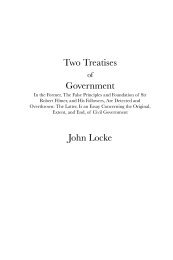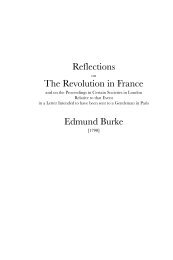Das Geheimnis des Opfers oder Der Mensch ist, was er iÃt The ...
Das Geheimnis des Opfers oder Der Mensch ist, was er iÃt The ...
Das Geheimnis des Opfers oder Der Mensch ist, was er iÃt The ...
Create successful ePaper yourself
Turn your PDF publications into a flip-book with our unique Google optimized e-Paper software.
14<br />
appropriately food and drink go togeth<strong>er</strong>. That the wine, moreov<strong>er</strong>, <strong>was</strong> poured onto the<br />
table or altar, onto the stove or even onto the ground, is self-und<strong>er</strong>stood, for the wine<br />
does not rise to heaven as does smoke from the burnt off<strong>er</strong>ing. “He poured out wine,” the<br />
Iliad states of Achilles, “looking up to heaven.” Why did he look up to heaven? Did he<br />
really see the fath<strong>er</strong> of the gods, for whose honour he sprinkled the wine? Are the gods,<br />
physically, prosaically visible as the stars or clouds in the sky? No! Man sees them only<br />
in his mind, in his imagination, in belief, because they themselves ex<strong>ist</strong> only in thought,<br />
belief, imagination. And in the same sense and spirit the wine too rises up to heaven even<br />
though it immediately falls to the earth as a sensuous deed and in actuality. Does God<br />
then actually hear the pray<strong>er</strong>s of mortals? Does he answ<strong>er</strong>, as the hearing of the Hebrews<br />
indicates, with an unambiguous, audible voice? Are your hymns and pray<strong>er</strong>s then, your<br />
religious dogmas and c<strong>er</strong>emonies in gen<strong>er</strong>al, not just as much without object and sense as<br />
the alms and sacrifices of the ancients, if you consid<strong>er</strong> the wooden beams in your own<br />
eyes with the same keen rational<strong>ist</strong> sharp-sightedness with which you recognize the<br />
motes in the eyes of the pagans? Thus the gods enjoy the food which is presented to them<br />
in the same sense and in the same way as the wine poured onto the earth, for they don’t<br />
really enjoy them eith<strong>er</strong>, not corporeally; rath<strong>er</strong>, they have, as abstracted, ideal i.e.,<br />
imagined beings, only the abstracted ideal enjoyment of them. <strong>The</strong> actual mat<strong>er</strong>ial<br />
enjoyment falls only to those who do the sacrificing, above all to the priests. Thus,<br />
because in reality the priests eat in place of the gods or in their name, the best foods and<br />
tasty bits are naturally the parts res<strong>er</strong>ved for the gods, also called a priestly or spiritual<br />
meal as much as a delicious meal.<br />
In a common G<strong>er</strong>man prov<strong>er</strong>b, which is as common as it true, “eating and drinking<br />
keep body and soul togeth<strong>er</strong>,” not only body and soul, but also God and man and I and<br />
Thou. In the same way as the Greeks and Romans rememb<strong>er</strong>ed their absent benefactors<br />
as well as their friends of both sexes at their feasts and bacchanalias when they drank to<br />
14. Wine, of course, <strong>was</strong> also poured on the incense that, aft<strong>er</strong> all, <strong>was</strong> not eaten. Thure dato faminis, vinoque in thura<br />
profuso. [aft<strong>er</strong> incense is consigned to the flames, togeth<strong>er</strong> with the wine which <strong>was</strong> poured into the incense]” (Ov.,<br />
“Met[amorphosen libri XV]”, 13, 656). But aside from the fact that the incense, at any rate among the Greeks and<br />
Romans, already belonged to lat<strong>er</strong> religious indulgence — Hom<strong>er</strong> knows nothing of it yet — the food <strong>des</strong>tined for the<br />
godhead is consumed by fire, consequently it evaporates in steam and vapour. And the incense stands in p<strong>er</strong>fect harmony<br />
with this result. Among the Hebrews incense itself <strong>was</strong> placed on the food off<strong>er</strong>ing of bread flour and then burned<br />
togeth<strong>er</strong> with one part of it. That is a fire, according to Leviticus 2, 1 & 2, “as an aroma pleasing to the Lord.” And<br />
among the Egyptians, according to H<strong>er</strong>odotus, the body of the animal sacrifice <strong>was</strong> filled with pure bread, honey, raisins,<br />
figs, incense, myrrh and oth<strong>er</strong> smoked ingredients and then burned, showing through this connection of pleasant-tasting<br />
and pleasant-smelling items, howev<strong>er</strong>, that the sacrifice <strong>was</strong> meant, at the same time, not only for the divine taste but<br />
for the divine sense of smell as well.








